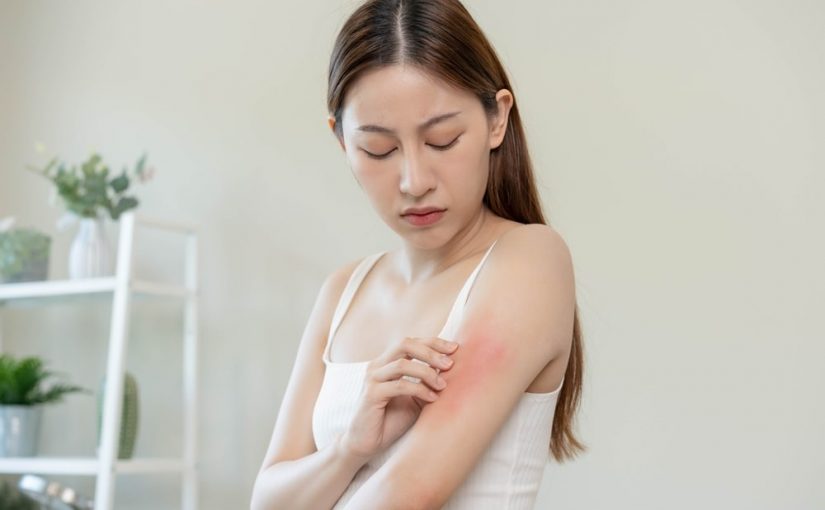How to Stop Eczema Itching Immediately?
Eczema, or atopic dermatitis, is a chronic skin condition characterized by dry, itchy, and inflamed skin. It can be an uncomfortable and frustrating condition to deal with. Still, there are steps How to stop eczema itching immediately and how you can take to alleviate symptoms and find relief.
The Big question that arises is: Why does eczema cause itchiness?
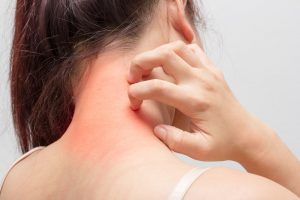
The neurological system, the immune system, and the skin function together in a network. Itching occurs as eczema flares, turning red and sore. Several chemical mediators, notably the neuropeptide substance P, are responsible for triggering inflammation. Blood flow is boosted by inflammation, which also helps to cause itching. Secondly, sweating also triggers itching.
Eczema’s complicated symptom of itching has both physiological and psychological roots. We’re trying to determine “Why does eczema itch?” It has become abundantly evident that people with eczema cannot control their need to scratch, let alone “stop scratching” when instructed to do so. Simply put, it’s not that easy.
Eczema may be a catch-all name for several dermatitis (skin inflammation) conditions. Few pointers to know this Eczema:
- Atopic eczema, or dermatitis is the most prevalent type of skin condition (sometimes, these 2 names are used interchangeably).
- Eczema can result from a genetic condition that compromises the function of the skin’s barrier.
- The most common age groups for eczema are newborns and children. However, there is no set age at which it can start.
- Environmental irritants or allergens, chemicals from soaps, perfumes, or other products, food allergies, stress, or variations in temperature or moisture are some causes of this skin condition.
- The use of Oral, topical, or immunosuppressive medications may be used in treatment. In such circumstances, a doctor’s prescription is indicated.
- Even while this type of illness cannot be prevented, taking self-care precautions such as regularly avoiding the hottest temperatures and known irritants will help reduce the severity of outbreaks.
In this blog, we will explore effective strategies to help you How to stop eczema itching immediately and provide immediate comfort to the skin of adults and even babies.
How to stop Eczema itching immediately in babies?
Improve bathing skills:

Cleaning your baby’s skin with a bath will help remove grime and other potential allergens. Use lukewarm water and a gentle, fragrance-free cleanser to solely wash your baby’s smelly or unclean areas when bathing him or her.
Keep your baby’s skin clean by not rubbing it and keep the bath time to five to ten minutes. Apply a fragrance-free moisturizer as soon as you get out of the bath, keeping in mind that thick creams and ointments work generally better than lotions or oils.
To get relief, moisturize your baby’s skin twice daily or as frequently as required.
Think about using topical corticosteroids:
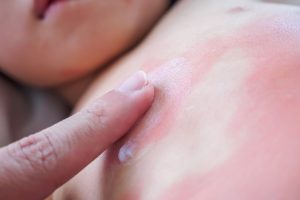
These drugs, which are frequently used to treat eczema, work by easing its itchy and inflammatory symptoms. Ointments, creams, lotions, sprays, and other formulations of topical corticosteroids are available.
Choose the ideal corticosteroid for your infant in consultation with your dermatologist, and administer it as soon as possible after the bath so that you may follow up with a moisturizer.
To prevent side effects, adhere to your dermatologist’s recommendations for the dosage, duration, and frequency of the therapy. Babies are more sensitive to corticosteroids than adults are, so follow their advice.
Determine and get rid of triggers:
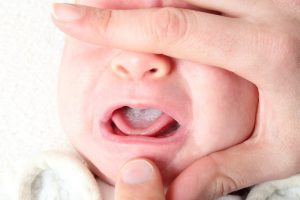
Your baby’s eczema may arise out of nowhere or get worse due to common causes. The body triggers like sweat, saliva, and scratching; environmental triggers like tobacco smoke, dry air, pet dander, or pollen; or product triggers like clothing, laundry detergent, fabric softeners, shampoos, or soaps (especially ones with fragrance); or baby powder or wipes are examples of common triggers.
Try to find strategies to prevent or remove your baby’s triggers if you can. Apply ordinary petroleum jelly around your baby’s mouth before feedings and naps, for instance, if you notice that your baby’s spit is causing eczema on the face.
Consider taking a bleach bath:

Although bleach bath therapy is rarely used on infants, if your baby’s eczema is difficult to manage, your dermatologist might advise it.
By lowering bacteria and irritation on the skin, diluted bleach baths can relieve your baby’s symptoms.
Follow your dermatologist’s recommendations for bleach bath therapy carefully to protect your baby’s safety and prevent harming their already sensitive skin.
What helps with Eczema Itching?
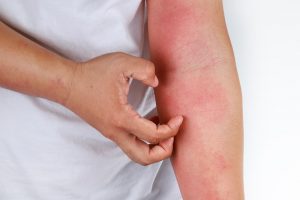
While it may seem like nothing can help the suffering, atopic dermatitis (AD), often known as eczema, can lessen its symptoms. Moreover, the proper diagnosis is always the first line of helping one to stop eczema itching immediately.
Your doctor will probably ask you about your symptoms, look at your skin, and go over your medical history in order to identify a topic dermatitis. To identify allergies and rule out other skin conditions, tests may be required.
Inquire with your healthcare practitioner about possible food allergies if you believe a specific food may have contributed to your child’s rash.
Patch Evaluation/ Patch Testing:
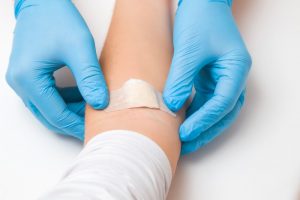
Patch testing on your skin can be advised by your doctor. Small amounts of various substances are put on your skin during this test, and you are then covered. The doctor examines your skin for indicators of a reaction during subsequent visits over a few days. Patch testing can be used to identify the precise allergies that are causing your dermatitis.
Here are some simple adjustments physicians advise making:
Regular moisturizing and other self-care routines may be the first step in the treatment of atopic dermatitis. Your doctor may advise medicated lotions that reduce irritation and aid in skin restoration if these don’t work. These are occasionally used in conjunction with other therapies.
Atopic dermatitis may last for years. To control it, you might need to try a variety of medications over months or years. Additionally, even if medication is effective, symptoms could flare up again.
How to Stop Eczema Itching Immediately in Adults?
One or two people may ooh and aah after giving in to the impulse. However, scratching or even rubbing might aggravate your eczema and the itching. Some scratchers bleed from their scratches, which might lead to an infection. When resting on your hands isn’t an option, try these home remedies for eczema itching and get quick skin soothing and relief:
Keep Your Skin Moisturized:
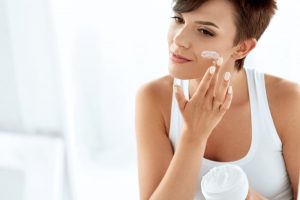
Moisturizing your skin is crucial in managing eczema symptoms.
Opt for fragrance-free and hypoallergenic moisturizers or emollients that are specifically formulated for sensitive skin.
Apply moisturizer generously and frequently, especially after bathing or washing your hands.
Look for products containing ingredients such as ceramides, shea butter, or glycerin, which help lock in moisture and soothe dry skin.
Take Short, Lukewarm Showers:

While hot showers may be relaxing, they can worsen eczema symptoms.
Prolonged exposure to hot water can strip away the skin’s natural oils, leading to increased dryness and irritation. Instead, take short showers or baths with lukewarm water.
Avoid harsh soaps or body washes that contain fragrances or irritants.
Pat your skin dry gently with a soft towel, leaving some moisture on the skin, and then immediately apply a moisturizer.
Identify and Avoid Triggers:
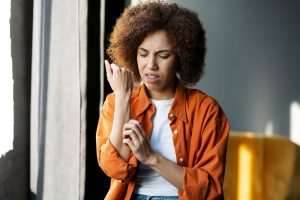
Eczema triggers can vary from person to person, so it’s essential to identify what factors worsen your symptoms.
Common triggers include certain fabrics (such as wool or synthetic materials), harsh detergents or cleaning products, extreme temperatures, certain foods, and stress.
Pay close attention to your environment and daily routine to pinpoint potential triggers.
Once identified, make a conscious effort to avoid them, or minimize exposure as much as possible.
Wear Soft, Breathable Fabrics:
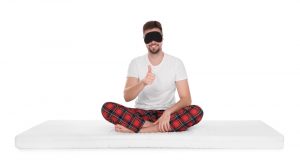
The clothing you wear can have a significant impact on your eczema. Opt for soft, breathable fabrics like cotton or bamboo that allow air to circulate around your skin, reducing irritation.
Avoid scratchy materials like wool or synthetic fibers, as they can cause itching and further exacerbate eczema symptoms.
Additionally, wash your clothes with mild, fragrance-free detergents to avoid any residual irritants.
Apply Cold Compresses:
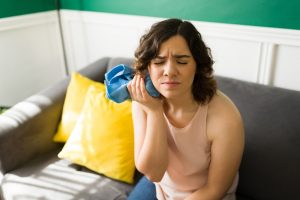
Cold compresses can provide instant relief for itchy and inflamed eczema patches. Soak a clean cloth or towel in cold water, wring out the excess, and gently apply it to the affected areas.
The cold temperature helps to reduce itching and inflammation, providing immediate comfort to your skin.
Repeat this process whenever you experience a flare-up or intense itching.
Medications for Eczema:
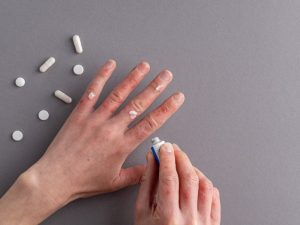
There are numerous methods for reducing itching and healing the skin. Products come in a range of strengths and can be applied as creams, gels, or ointments. Discuss your choices and the available possibilities with your healthcare practitioner. Whatever you choose, use it as advised (often twice a day) before applying moisturizer. The skin may thin if a corticosteroid product is overused which has adverse consequences.
- For people older than two, calcineurin inhibitor-containing creams or ointments may be a viable choice. Tacrolimus (Protopic) and Pimecrolimus (Elidel) are two examples. Before moisturizing, use it as advised. When using these items, stay out of direct sunlight.
- Medication to treat infections. Antibiotic pills may be recommended by your doctor to treat an infection.
- Pills for reducing inflammation. Your doctor may prescribe medicines to assist reduce your symptoms if your eczema is more severe. Cyclosporine, methotrexate, prednisone, mycophenolate, and azathioprine are potential options. Although these tablets work, they shouldn’t be used for an extended period due to potentially harmful side effects.
- Others: Dupilumab (Dupixent) and Tralokinumab (Adbry), two injectable biologics (monoclonal antibodies), may be choices for persons with moderate to severe illness who don’t respond well to previous treatments.
However, the best medicine for eczema itching is any ointment having 1% Hydrocortisone, which can help to temporarily relieve itching, buying you time to visit the doctor.
Treatments for Eczema Itching:
Wet bandages:
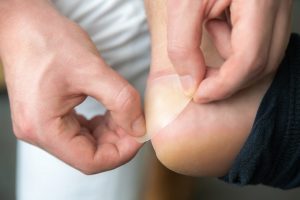
Applying a corticosteroid ointment and securing the drug with a wrap of wet gauze covered by a layer of dry gauze is an efficient, intensive treatment for severe eczema.
Due to the laborious nature of the procedure and the need for nursing skills, this is occasionally performed in a hospital for patients with broad lesions.
Or inquire with your doctor about safely applying this procedure at home.
Luminous treatment:

People who either don’t improve with topical therapies or quickly flare following therapy are given this treatment.
Exposing the affected area to controlled doses of natural sunshine is the most basic type of light treatment (phototherapy).
In other types, medicines or synthetic UVA and UVB (narrow band) are used alone or in combination.
Treatment of eczema nowadays mostly uses what is known as narrowband UVB phototherapy. Here the skin is only exposed to UVB rays with a wavelength of 311 to 313 nanometers.
Long-term light therapy:
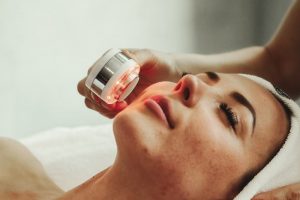
Despite being beneficial, long-term light therapy has negative side effects, such as early skin aging, hyperpigmentation, and an elevated risk of skin cancer.
For these reasons, phototherapy is not given to infants and is used less frequently on young children.
Studies show that phototherapy can safely and effectively treat children with eczema. Phototherapy can reduce stubborn eczema.
Talk to your doctor about the advantages and disadvantages of light treatment.
Counseling:

Speaking with a therapist or other counselor can be beneficial if you’re embarrassed or frustrated by your skin issue. Eczema sufferers frequently deal with negative self-perception and low self-esteem. In extreme circumstances, their skin’s appearance can lead to mocking and, particularly with children, disrupt relationships between peers. Atopic dermatitis patients and those who care for them may experience sleep difficulties, which adds to the stress already present.
Patients with eczema who are under a lot of stress may benefit from counseling or even from taking anti-anxiety medications. People who struggle to control their scratching may benefit from relaxation treatment and biofeedback.
CBT, also known as cognitive-behavioral therapy, is a type of therapy that concentrates on altering your attitude and way of thinking to stop undesirable behaviors. For those who have eczema, this can entail coming up with techniques to keep you from scratching when under pressure.
Additionally, therapists can offer advice on how to relax so that you can look after your mental health by lowering stress. These could consist of workouts like:
- Mindfulness,
- Meditation,
- Hypnotherapy
These are the ways that show how to stop eczema itching immediately.
End-Note:
While eczema is a chronic condition that requires long-term management, there are steps you can take to alleviate symptoms and find immediate relief. Living with eczema can be challenging, but with the right strategies and self-care practices, you can effectively manage your symptoms and improve your quality of life.
By understanding the causes, recognizing common symptoms, and implementing effective management strategies like regular moisturization, trigger avoidance, and gentle skin care practices, you can minimize itching, and flare-ups, and achieve relief from eczema.
Remember, each person’s experience with eczema is unique, so it’s essential to find a personalized approach that works best for you. With patience and consistent care, you can take control of your eczema and improve your skin health.
FAQs:
How to stop eczema itching at night?
Showers before going to bed, cotton or plastic gloves, Wet dressings over the area, Keeping the temperature cool, and using cotton bed sheets are the few remedies to be used to get relief from Eczema at night.
Does Benadryl help with eczema itching?
No, not all itch kinds can be efficiently treated by Benadryl (antihistamines). They don’t appear to be beneficial in reducing eczema-related itching. While sedating antihistamines can aid in your sleep, studies have shown that neither sedating nor non-sedating antihistamines can heal eczema.
What is the essential oil for eczema itching?
Lavender oil is used for aromatherapy to calm the itching and helps to relax.
What is the best eczema cream for itching?
Vaseline or Moisturizers are the best creams for itching and are non-medicated. For medicated ones: The Cerave lotions, Eucerin eczema relief cream, Vanicream products, and Aveeno goods are some of the best eczema creams.
What supplements can I take for eczema itching?
Fish oil, Vitamin D and E, Zinc, Melatonin, and Probiotics are a few of the supplements to be included in your diet for eczema itching.
What stops eczema from itching?
One can learn how to stop eczema itching immediately by Distraction, Cool Compresses, and Bathing. Application of ointments or taking drugs can also help to get relief but this takes time.

